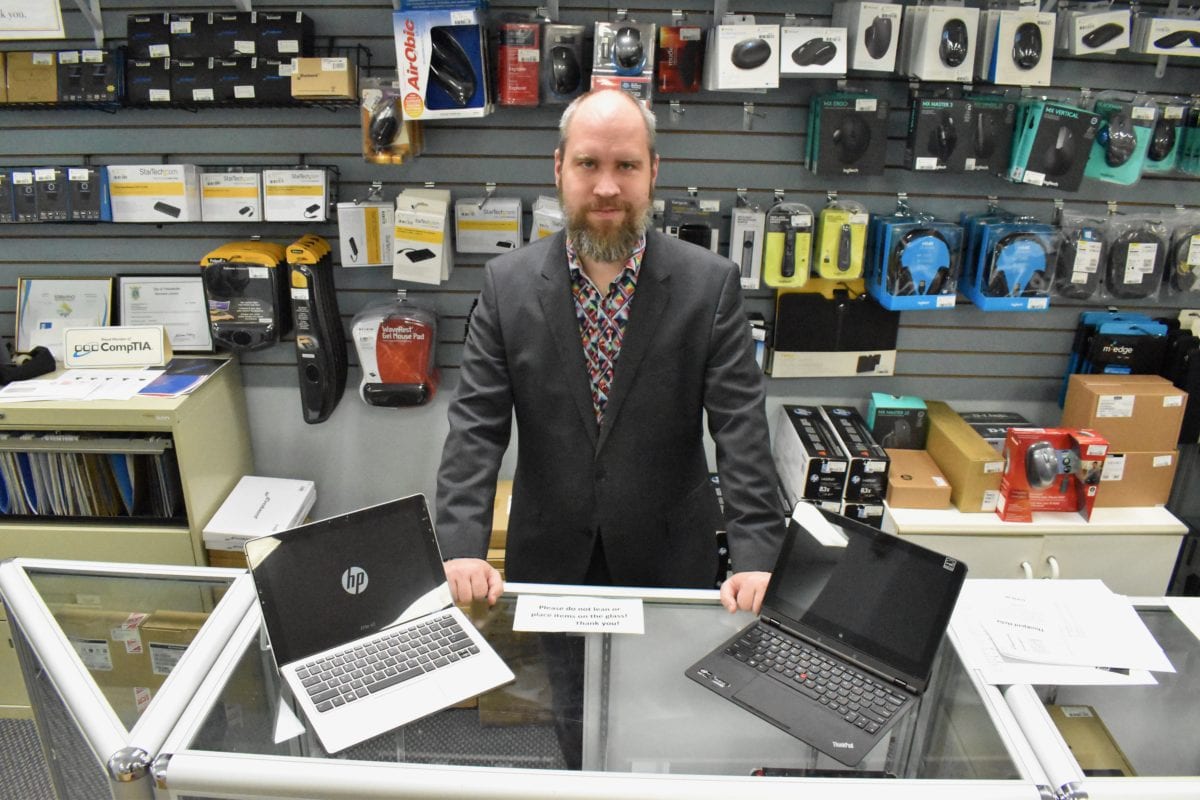The Covid pandemic has exerted push and pull effects on most businesses, and Tamarack Computers has experienced both.
The Yk Centre Mall-based company offers hardware sales, training and services for clients across the NWT and Nunavut.
When its downtown shop closed in mid-March, its in-person software, networking and security training courses were suspended, hampering the training side of the business.

Blair McBride/NNSL photo
But when most of its business clients were forced to work remotely from home, demand increased for computing hardware, driving up Tamarack’s sales of laptops, monitors and cameras.
“We’ve had a 75 per cent loss of training this year,” said company president Rob Crouch. “(And) hardware sales are actually up a little bit because of the extra equipment that people needed. We’re up about 10 per cent in sales.”
Tamarack was fortunate that its managed services – basically functioning as the IT department for its business clients – and hardware sides weren’t affected as much as the training.
The company could continue its own work remotely even as all but two of its 10 staff had been sent home.
Its office remained closed for almost three months until the NWT entered phase two of the recovery period on June 12.
Training courses came back but at a maximum of six students per class to comply with physical distancing measures. Those classes normally have 15 students. Many courses were postponed from summer until fall. But some classes didn’t take place at all this year, such as summer programming sessions for young students.
Managed services have shifted to more of a remote format during the pandemic.
“When we deal with troubleshooting a computer issue, we might have gone on-site previously. But we tend to try and do that remotely now, even though we might find it a little bit easier to communicate when we see (someone) in person,” said Crouch.
Hardware-related connectivity projects in the communities were also postponed by a few months.
“It all got done, though, it just got moved. It was frustrating, but it didn’t have such a big impact,” Crouch said.
From the outside, it appears that Tamarack pulled through the past six, difficult months. But from the inside, and as a business-to-business company that depends on varying degrees of economic vulnerability, the picture is different.
While increased hardware sales were a positive for the company, it too triggered some anxiety when supplies narrowed due to Covid-related shutdowns of manufacturers.
“Things were hard to get for a while, so that was scary. I think that was the biggest thing early on – there was a lot of uncertainty,” Crouch said.
Not knowing how the pandemic would affect his business clients also brought a sense of apprehension.
“We don’t know how it’s going to affect us and how it’s going to affect our clients and their budgets,” Crouch said. “Other than that, there have been challenges with travel. When we have to travel to Nunavut, the paperwork and the time delays that come with travel are (difficult).”
But, almost seven months into the pandemic, Tamarack is still standing and its operations have so far not experienced longstanding change.
“And it’s nice to have projects finished and get back on top of things,” said Crouch. “I was really concerned at the beginning of the year. Now, we’ve found things have shifted rather than been lost. I feel there’s a level of comfort there.”

